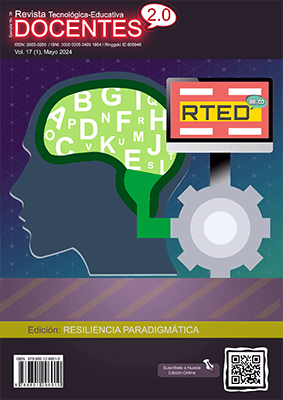Classification of Artificial Intelligence Tools in Education
 DOI:
https://doi.org/10.37843/rted.v17i1.513
DOI:
https://doi.org/10.37843/rted.v17i1.513
Main Article Content
Abstract
In the educational field, characterized by its rapid evolution, technology has emerged as a decisive factor, with artificial intelligence (AI) establishing itself as a fundamental catalyst in the sector's transformation. The essay explores how the classification of AI tools in education can optimize teaching and learning processes by adopting an inductive method and hermeneutic paradigm with a qualitative, interpretive approach and topical narrative design. That allowed a deep exploration when classifying and studying the tools, thus identifying their distinctive characteristics and particular applications in various educational contexts and the effectiveness of learning. It was shown that effective classification of AI tools could be a vehicle to promote educational equity, ensuring that students of all socioeconomic levels and abilities have access to high-quality educational resources. By better understanding how these tools are classified, those involved in the educational process can expand their strategies to incorporate technologies ethically and equitably into educational systems. In conclusion, the importance of the detailed classification of artificial intelligence tools in education is underlined, proposing that a systematic and well-founded approach to integrating AI can revolutionize teaching and learning methods, adjusting them to contemporary needs and challenges of the educational field.
Downloads
Metrics
Article Details

This work is licensed under a Creative Commons Attribution-NonCommercial-NoDerivatives 4.0 International License.
Those authors who have publications in our journal accept the following terms:
- When a work is accepted for publication, the author retains rights of reproduction, distribution of his/her article for exploitation in all countries of the world in the format provided by our magazine and any other magnetic medium, optical, and digital.
- Authors will retain their copyright and guarantee the journal the right first to publish their work, which will be simultaneously subject to the Creative Commons Acknowledgment License (Attribution-NonCommercial-NoDerivatives 4.0 International (CC BY-NC-ND 4.0)). That allows third parties to copy and redistribute the material in any medium or format, under the following conditions: Acknowledgment - You must properly acknowledge authorship, provide a link to the license, and indicate if any changes have been made. You may do so in any reasonable way, but not in a way that suggests you have the licensor's endorsement or receive it for your use. NonCommercial - You may not use the material for a commercial purpose. NoDerivatives - If you remix, transform, or build from the material, you cannot broadcast the modified material. There are no additional restrictions - You cannot apply legal terms or technological measures that legally restrict you from doing what the license allows.
- Authors may adopt other non-exclusive license agreements to distribute the published version of the work (e.g., deposit it in an institutional archive or publish it in a monographic volume) provided that the initial publication in this journal is indicated.
- Authors are allowed and recommended to disseminate their work through the Internet (e.g., in institutional telematic archives, repositories, libraries, or their website), producing exciting exchanges and increasing the published work's citations.
- Request of withdrawal an article has to be done in writing by the author to the Editor, becoming effective after a written response from the Editor. For this purpose, the author or authors will send correspondence via e-mail: [email protected].
- The author will not receive financial compensation for the publication of his work.
- All Docentes 2.0 Journal publications are under the Open Journal System (OJS) platform at: https://ojs.docentes20.com/.
References
Hinton, G. (2018). La revolución de la inteligencia artificial: cómo transforma el acceso a la información. Editorial Tecnológica.
McCarthy, J. (2007). What is Artificial Intelligence? Stanford University. DOI: https://doi.org/10.1145/1283920.1283926
Millán-Gómez, M. & Mujica-Sequera, R. (2023). Contraste de Políticas Públicas en el Contexto Tecnoeducativo. Revista Tecnológica-Educativa Docentes 2.0, 16(2), 50-60. https://doi.org/10.37843/rted.v16i2.376 DOI: https://doi.org/10.37843/rted.v16i2.376
Minsky, M. (1974). A framework for representing knowledge. MIT.
Russell, S., & Norvig, P. (2016). La inteligencia artificial. Un Enfoque Moderno (2da edición). Pearson.
Unesco (2021). Recomendación sobre la ética de la inteligencia artificial. Organización de las Naciones Unidas para la Educación, la Ciencia y la Cultura.






